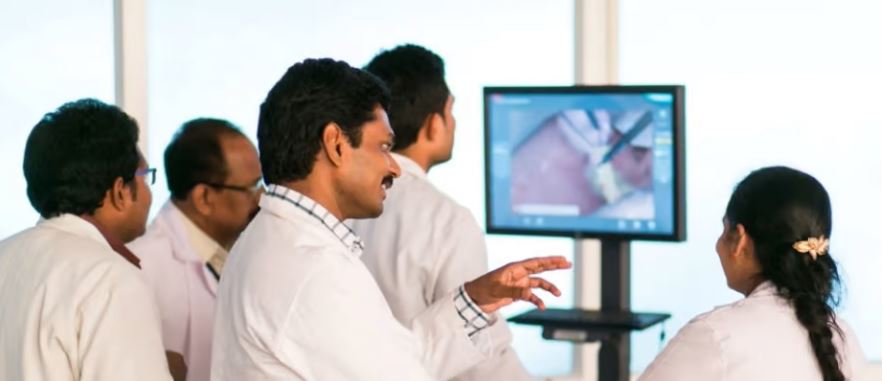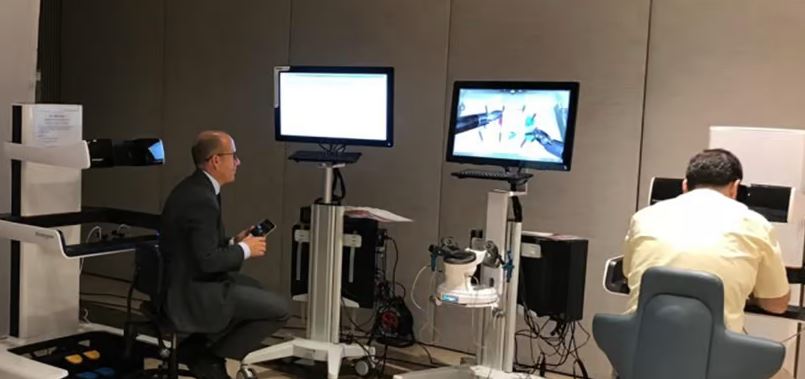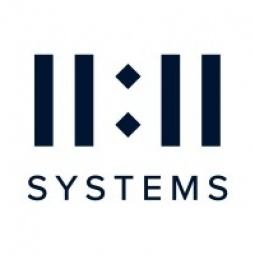Download PDF
Wilson Center turns to 11:11 Systems for unmatched disaster recovery in the cloud
Technology Category
- Infrastructure as a Service (IaaS) - Cloud Computing
- Infrastructure as a Service (IaaS) - Cloud Storage Services
Applicable Industries
- Education
Applicable Functions
- Business Operation
Services
- Cloud Planning, Design & Implementation Services
- Cybersecurity Services
The Challenge
The Wilson Center, a top-ranked regional studies think tank, was in need of a secure and cost-effective disaster recovery solution. The center's data is sensitive in nature and its location in the nation's capital necessitated a robust solution to protect against outside attacks. The IT department, led by Chief Technology Officer Bruce Griffith, is lean and required a low-maintenance solution. The center had previously had a bad experience with a disaster recovery solution that failed to deliver reliable data replication. The new solution needed to be flexible, reliable, and cost-effective, with the ability to protect every user's information and ensure accessibility for both daily use and emergency failovers.
About The Customer
The Wilson Center is a key non-partisan policy forum in the United States, tackling global issues through independent research, open dialogue, and actionable ideas. Chartered by Congress in 1968 and headquartered in Washington, D.C., the center brings fresh thinking and deep expertise to the most pressing policy challenges we face today. In 2019, the Wilson Center was named the No. 1 regional studies think tank in the world. Every academic year, the Wilson Center welcomes more than 120 new fellows and 200 interns. The IT department at the Wilson Center covers everything from managing each user’s desktop and collaboration systems to the overall IT infrastructure.
The Solution
The Wilson Center turned to 11:11 Systems for its disaster recovery needs. The 11:11 DRaaS for Zerto solution offered a versatile and cost-effective solution that simplified disaster recovery management. The solution's flexible pricing per VM and per TB of storage allowed the center to protect different workloads and only pay for what was being used, with the flexibility to grow the number of protected VMs in the future. In addition to flexibility, the solution also prioritized security. The advanced security features of the 11:11 Cloud platform, including encryption, intrusion detection, and antivirus/anti-malware, helped the IT team meet federal requirements. The solution also offered colocation capabilities for an additional security device, ensuring the security and confidentiality of the center's data.
Operational Impact
Related Case Studies.

Case Study
IoT platform Enables Safety Solutions for U.S. School Districts
Designed to alert drivers when schoolchildren are present, especially in low-visibility conditions, school-zone flasher signals are typically updated manually at each school. The switching is based on the school calendar and manually changed when an unexpected early dismissal occurs, as in the case of a weather-event altering the normal schedule. The process to reprogram the flashers requires a significant effort by school district personnel to implement due to the large number of warning flashers installed across an entire school district.

Case Study
Revolutionizing Medical Training in India: GSL Smart Lab and the LAP Mentor
The GSL SMART Lab, a collective effort of the GSL College of Medicine and the GSL College of Nursing and Health Science, was facing a challenge in providing superior training to healthcare professionals. As clinical medicine was becoming more focused on patient safety and quality of care, the need for medical simulation to bridge the educational gap between the classroom and the clinical environment was becoming increasingly apparent. Dr. Sandeep Ganni, the director of the GSL SMART Lab, envisioned a world-class surgical and medical training center where physicians and healthcare professionals could learn skills through simulation training. He was looking for different simulators for different specialties to provide both basic and advanced simulation training. For laparoscopic surgery, he was interested in a high fidelity simulator that could provide basic surgical and suturing skills training for international accreditation as well as specific hands-on training in complex laparoscopic procedures for practicing physicians in India.

Case Study
Implementing Robotic Surgery Training Simulator for Enhanced Surgical Proficiency
Fundacio Puigvert, a leading European medical center specializing in Urology, Nephrology, and Andrology, faced a significant challenge in training its surgical residents. The institution recognized the need for a more standardized and comprehensive training curriculum, particularly in the area of robotic surgery. The challenge was underscored by two independent studies showing that less than 5% of residents in Italian and German residency programs could perform major or complex procedures by the end of their residency. The institution sought to establish a virtual reality simulation lab that would include endourological, laparoscopic, and robotic platforms. However, they needed a simulator that could replicate both the hardware and software of the robotic Da Vinci console used in the operating room, without being connected to the actual physical console. They also required a system that could provide both basic and advanced simulation training, and a metrics system to assess the proficiency of the trainees before they performed surgical procedures in the operating theater.

Case Study
Edinburgh Napier University streamlines long-distance learning with Cisco WebEX
• Geographically dispersed campus made in-person meetings costly and inconvenient.• Distance-learning programs in Malaysia, India, and China required dependable, user-friendly online tools to maximize interaction in collaborative workspaces.• Virtual learning environment required a separate sign-in process, resulting in a significant administrative burden for IT staff and limited adoption of collaboration technology.

Case Study
8x increased productivity with VKS
Before VKS, a teacher would spend a lot of time showing a group of 22 students how to build a set of stairs within a semester of 120 hours. Along with not leaving the teacher much time to provide one-on-one support for each student to properly learn carpentry, it also left a considerable amount of room for error. Key information would be misinterpreted or lost as the class was taught in the typical show-and-tell way.

Case Study
Scalable IoT Empowering GreenFlex's Sustainable Growth
GreenFlex, a company that supports sustainable development, decarbonization, and energy efficiency, faced several challenges in its quest to expand its business. The company needed to deploy a robust and sustainable IoT technology to support its growth. It was crucial for them to monitor and control devices at customer sites in a safe and reliable manner. They also needed to integrate devices across a range of communication protocols and gather and act on data to meet efficiency targets. GreenFlex had previously built IoT capabilities into its digital platform, GreenFlexIQ, to monitor and manage customer sites remotely. However, they soon realized that they needed a new platform to support their ambitions. They needed a platform that could scale to connect more devices for production management and make it easier for the operations team to manage devices in the field.





